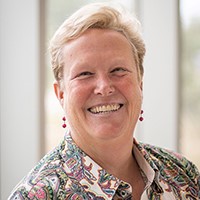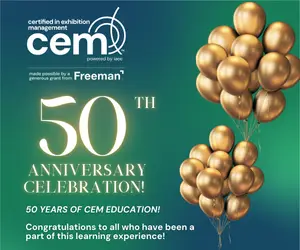By Mary Tucker, Sr. PR/Communications Manager, IAEE

Janet Sperstad, CMP-Fellow is Faculty Director, Event Management Business Solutions at Madison College. Her professional history reflects her lifelong vocation: driving excellence in meeting and event management execution and education. She has dedicated her career to defining the competencies and career pathways that articulate meeting planning as a design discipline – separate and distinct from hospitality – requiring skills in the social sciences, executive leadership, and the cognitive sciences.
Janet’s contributions are global in scope and rooted in more than 25 years as a meeting professional and executive leader in the corporate and non-profit sectors. She has been employed by a Fortune 500 global company, a statewide association, and owned a professional event management firm. Janet currently leads Madison College’s Meeting and Event Management Associate degree program, which she founded in 2002. This award-winning program is recognized for its stringent requirements that faculty demonstrate direct meeting planning experience and credentials. In addition, the program currently offers the greatest number of meeting and event management credits in the United States, and has served as a model for other programs at colleges and universities in North America and Europe.
Janet also serves on the faculty of IAEE’s Certified in Exhibition Management® designation program and facilitates the Neuroscience of Exhibitions and Events course module, which examines why our brains are wired to socially connect and ways to leverage that in our events and exhibitions; explores meeting room designs and exhibition floor layouts to create brain-friendly environments that drive the results you want; and teaches an overall approach in executing events using industry best practices and CEM standards through a neuroscience lens.
In Part One of this two-part blog series, Janet shares with readers how neuroscience relates to exhibition management, especially when it comes to the trust factor and how show organizers can incorporate this understanding to maximize their events.
IAEE: You have stated that we don’t talk enough about trust as it relates to trade shows. What do you mean by that?
Janet: One conversation that is often overlooked when people talk about exhibitions and events is how much these experiences foster trust. Trust is the operating system of our relationships. We often talk about how exhibitions and events help networking, meeting new people, bringing people together to do business, their design and engagement – all of which is the unspoken, underlying, and very important element of trust.
Ultimately, the one thing we create with these experiences that no other marketing channel can touch is that we build trust. You can have engagement without trust, but you can’t have trust without engagement. In other forms of business, that engagement with customers can be achieved through consistency, solid pricing, being on time, all of those things. But when it comes to our industry, we’re not just selling widgets and we certainly don’t engage with widgets, we have people at booths talking to other people.
Most of our information – 93 percent – comes from non-verbal cues. It’s a massive sensory filter that we use in live experiences in how take in information, how we listen and how we connect, because the brain is a social brain and the foundation we are building upon is based on trust. If we think about how to help people trust us, how we trust them and how we build trust, I think that’s not a conversation we often talk about in our space.
IAEE: What do you mean by “the brain is a social brain”?
Janet: The brain lights up when people connect and the neurons in their brains sync up. As such, our events form informal cultures and informal norms, which is really about connecting. We connect biorhythmically and cognitively when we are all together at these live experiences – it’s like we are synced as one. Which means we are taking in all this information that elicits trust, and your senses are helping you build that information.
I think trade shows, more than any other event, build trust because when you walk on to the floor you are already saying, “I have a need. I’m curious. I’m interested.” You’re already leaning into the moment and willing to let your guard down a bit which means your brain is receptive to the surrounding influence, engagement and sense of connectedness to one another.
IAEE: What is going on in attendees’ brains as they navigate the show floor?
Janet: It’s such a social atmosphere. It’s not about sitting and learning information like we have in our breakout sessions or general sessions. It’s this whole social experience where, as an attendee, I listen, I look, I feel, I smell and use all those things to build information, In turn, this builds a sense of reward because I’m happy – I can feel the energy, I can feel the excitement – and so it starts to build trust. When we walk down the aisle, we’re more willing to lean into a conversation than we would walking down a hallway.
Knowing that you’re with like-minded people, people that are in your industry/profession, knowing you’re going to be with people that will have solutions to problems you don’t know the answers to – it really matters to attendees. Show organizers must curate that need and focus in on the target markets so that we bring the right people together. This engagement cuts deep through all the filters and that’s when you start building relationships.
Part Two details what happens in the brain as trust is being created and how show organizers can apply this to their events. Stay tuned!


